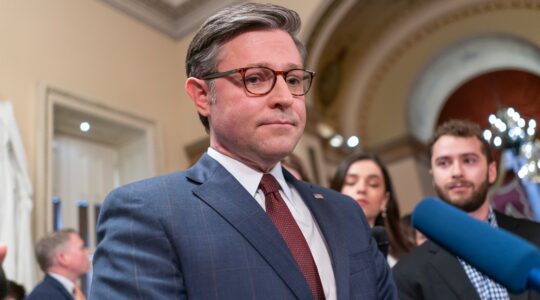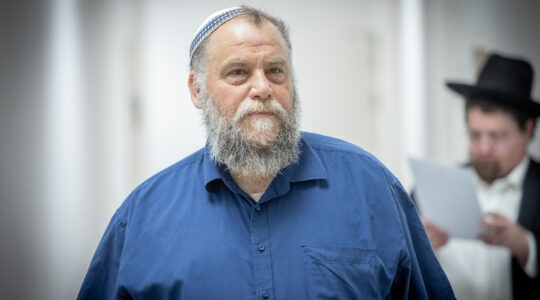WASHINGTON (JTA) – A month or so into the age of Obama, Israel’s strategies in dealing with the new world reality are becoming clear.
On the Middle East-macro — the Iranian threat — Israel is deferentially following the U.S. lead as the Obama team lays the groundwork for increasing pressure on diplomatic outreach toward Tehran.
As to the immediate neighborhood — talks with the Palestinians — Israel wants to know more as the Obama administration vows to press forward with attempts to create a Palestinian state.
At stake is not simply the health of U.S.-Israeli ties but perhaps the outcome of the two most pressing security and diplomatic challenges facing officials in Jerusalem.
Two factors are driving Israel’s willingness to take cues from the Obama administration on Iran strategy: The problem is too big for Israel to handle alone, and the White House’s approach in any case appears to be as good as Israel would expect from any U.S. government.
“We appreciate the review the administration is doing” on Iran, said Sallai Meridor, Israel’s ambassador to Washington, in a briefing last week organized by The Israel Project. “We know they are taking the issue very seriously.”
Whatever thoughts Jerusalem had about taking unilateral military action to stop or delay Iran’s suspected nuclear program were dampened last year when then-President Bush and Adm. Mike Mullen, the chairman of the U.S. Joint Chiefs of Staff, made clear to Israeli leaders that American support would not be forthcoming.
Chances of a unilateral attack dropped almost to nil without the prospect of U.S. tactical assistance and diplomatic cushion. The turndown from the president that many Israelis considered their best friend ever in the White House helped lower expectations after Barack Obama was elected, which makes it seem sweeter now that it appears the new administration is bent on living up to its pledges to take aggressive action to contain Iran.
The most substantive sign yet of a tough Obama policy on Iran was the recent appointment of Dennis Ross as the top State Department official on the issue.
Ross was among Obama’s most hard-line advisers on Iran policy during the campaign, emphasizing to JTA in an interview at the time the sequence of a “sticks then carrots” policy — first enhancing Iran’s isolation, then offering incentives.
According to a Washington Times report, the first task for Ross has been to craft the Iran “national security policy directive,” the lead document defining strategy on a problem.
The Obama administration already appears to be taking steps toward the Ross strategy. Reports Tuesday said the president offered Russia a trade: The United States would retreat from deploying a missile defense system in Europe if Russia intensified its commitment to isolate Iran.
Israel had voiced support for the missile defense system, a signature defense policy of the Bush administration — part of its design was to deter Iran, after all — but pro-Israeli figures are suggesting behind the scenes that it is not worth the cost of alienating Russia, which with China is a power considered critical in effectively isolating Iran.
The U.S. Navy also played a key role last month in keeping an Iranian-leased ship from completing a delivery to Syria of weapons that Israel believed to ultimately be destined for one of its radical enemies: Hezbollah in Lebanon or Hamas in the Gaza Strip.
Signs of an aggressive U.S. Iran posture have given Israel the room to embrace the Obama administration’s strategy of increased diplomatic outreach. Meridor glossed Israel’s support for outreach with a sooner-rather-than-later spin: As long as such efforts were part of a strategy of containing the nuclear weapons program, it made sense to do it now.
“The question is how dialogue can play a role in the limited time we have,” he said.
Meridor rejected arguments that it might be worth waiting out the June elections in Iran, which might return the presidency to Mohammad Khatami, the relative moderate who held the office before the election of Mahmoud Ahmadinejad, the incumbent Holocaust-denying radical who has wished aloud for Israel’s demise. Ultimately, Meridor said, it it the theocracy that controls the power in Iran, so the difference between the two is small.
“This threat to America, to Israel, to the world, is in the hands of the supreme leader of Iran,” he said, referring to Ayatollah Ali Khameini, “and is hardly impacted, or at least is not significantly impacted, by whoever is in the role of president.”
Signs of comity on Iran were sidelined this week by the pronounced commitment from U.S. Secretary of State Hillary Rodham Clinton to press toward Palestinian statehood.
Clinton was in the region to announce her $900 million contribution to the Palestinians after the Gaza Strip war. Significantly, just a third of that is going to Gaza, a sign of administration fears about dealing with a territory that is still controlled by Hamas.
Addressing the funders conference in the Egyptian resort of Sharm el-Sheik, where the Palestinian Authority hoped to raise $2.8 billion, Clinton insisted that the Palestinian Authority and the United States had installed “safeguards.” The goal, she said, was to make sure the money “does not end up in the wrong hands” — a formulation that does not explicitly rule out the use of a Hamas affiliate as a conduit for disbursing the funds in the Gaza Strip.
Clinton wants to use the money not just for relief but to jump-start the road to Palestinian statehood and a permanent peace agreement. That might not sit well with the incoming Israeli government led by Benjamin Netanyahu, who has played down Palestinian statehood.
Clinton and Netanyahu met Tuesday, with the prime-minister delegate saying afterward that he and Clinton had “found a common language” on Iran and the Palestinian issue. Both Netanyahu and Israeli Defense Minister Ehud Barak said that in their respective meetings with Clinton, they had urged her to set a deadline for U.S. talks with Iran.
In a sign that Clinton wants to create the political space for Netanyahu to accommodate her demands, her staff leaked to the Washington Post that in meetings with an Arab leader, she agreed that Iran will likely be more receptive to pressure than outreach — repeating Ross’ “sticks then carrots” formula.
Arab nations are anxious as well about the prospect of a nuclear Iran. In a speech Tuesday to the Arab League in Cairo, Prince Saud al-Faisal, the Saudi foreign minister, said the top Arab priority should be a unified policy on what he called Iran’s nuclear “challenge.”
Some observers say the push for Palestinian statehood eventually may require national unity between Hamas and the P.A. moderates with whom Israel and the United States prefer to deal.
The U.S. Congress frustrated such an arrangement three years ago, the last time Hamas and P.A. President Mahmoud Abbas tried to forge a cohabitation agreement. Western insistence on isolating Hamas, in part, helped bring about the collapse of that arrangement, which devolved into a bloody civil war — and drove moderates from Gaza.
Some pro-Israel lawmakers in Washington have told JTA that Congress might not object this time if Hamas defers to Abbas on foreign policy and security issues, but Meridor said Israel would not accept any government that had Hamas in it.
The idea of Hamas deferring to moderates is “wishful thinking,” he said. “They want to take over Palestinian society.”





